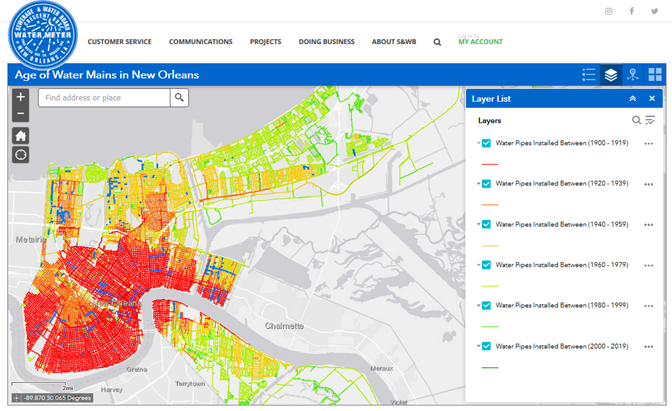Editor’s Note: In 2020 (and 2021), there have been a lot of unanswered questions about life and living, so in our partnership with the Chemical Engineering Service Learning Class at Tulane University, taught by Dr. Julie Albert, we made it our aim to find questions we could answer. The series is called “Dear Big Chem-EZ” (think “Dear Abbey” but with less about “Why does my partner ignore me?” and more about “Can I actually drink my tap water?” and “What’s that smell outside my house?”).
You can look for new pieces on the second Wednesday of every month. Up today, we have a look at how storms and water line breaks affect the safety of our drinking water. If you have questions you’d like answered, send them to thebigchemez@gmail.com.
Dear Big Chem-EZ, I read your previous article, “Is it safe to drink the tap water in New Orleans?”, but what happens to the drinking water supply after major storms and breaks in the water lines?
Yes, the water taken from the Mississippi River does go through an elaborate water purification process to make it safe to drink.1 The Sewerage and Water Board of New Orleans also performs periodic tests on the water quality of the finished treated water and water samples taken from different points in the distribution system within the city and performs additional water tests when a water main breaks or storm occurs. The water quality tests check for basic items such as pH, alkalinity, hardness, fluoride, etc. and also for contaminants such as microbial, organic, & metal based items and adjusts water treatment accordingly to keep water quality within acceptable safety standards.2 In reference to organic contaminants, the Sewerage and Water Board states “In the years since this screening began, the running annual averages observed have always been found to be below the Maximum Contaminant Levels (MCLs) set by the EPA.”3
So, basically, the Sewerage and Water Board performs these tests on water samples taken at periodic intervals from different locations around the city. From the results of these tests, Sewerage and Water Board adjusts the treatment process to maintain a safe water supply within acceptable limits.
If the Sewerage and Water Board knows about the occurrence of a major problem that may result in unsafe drinking water temporarily for part or all of the city, the Sewerage and Water Board will issue a Boil Water Advisory and perform action steps for improvement of the water quality to meet safety standards.4 But, since the vast majority of the water distribution piping in New Orleans was installed between 1900 and 1919, a lot of the water distribution system is more susceptible to breaks in the piping. (See the portion of the early system piping in red on the map for the Age of Water Mains in New Orleans and the areas that may affect you).

Photo of map of ‘Age of Water Mains in New Orleans’ by Sewerage and Water Board of New Orleans
https://www.swbno.org/About/DataAndStatistics, Data & Statistics, Sewerage and Water Board of New Orleans, updated 1/14/20.
In summary, the Sewerage and Water Board of New Orleans does its best to maintain a safe water supply, but short-term situations could occur where contaminants in the water supply could exceed the established acceptable quality limits. When the Sewerage and Water Board of New Orleans is aware of these situations, an advisory notice will be issued and perform action steps to for improvement of the water quality to meet safety standards.
-Big Chem-EZ
References
1 https://www.swbno.org/DrinkingWater/Purification , Sewerage and Water Board of New Orleans, LA, updated 4/14/2020.
2 https://www.swbno.org/DrinkingWater/Quality, Water Quality, Sewerage and Water Board of New Orleans, LA, updated 4/20/2020.
3https://www.swbno.org/DrinkingWater/Quality, Organic Contaminants, Water Quality, Sewerage and Water Board of New Orleans, LA, updated 4/20/2020.
4https://www.swbno.org/News/BoilWater, Boil Water Advisories, Sewerage and Water Board of New Orleans, LA, updated 8/29/2019.
 NOLAbeings Multimedia artist Claire Bangser created NOLAbeings as a portrait-based story project that marries...
NOLAbeings Multimedia artist Claire Bangser created NOLAbeings as a portrait-based story project that marries...  Voodoo in New Orleans: Reviving history: New Orleans fortune telling This article takes a deep dive into the history of Voodoo in New Orleans, its hybridization with Catholicism, and its present-day place in the city's culture. The author visits fortune-tellers in the French Quarter, using their guidance as a tool for introspection rather than a deterministic predictor of the future. Through her experiences in New Orleans, the author feels a mystical connection to both the past and the future.
Voodoo in New Orleans: Reviving history: New Orleans fortune telling This article takes a deep dive into the history of Voodoo in New Orleans, its hybridization with Catholicism, and its present-day place in the city's culture. The author visits fortune-tellers in the French Quarter, using their guidance as a tool for introspection rather than a deterministic predictor of the future. Through her experiences in New Orleans, the author feels a mystical connection to both the past and the future. 